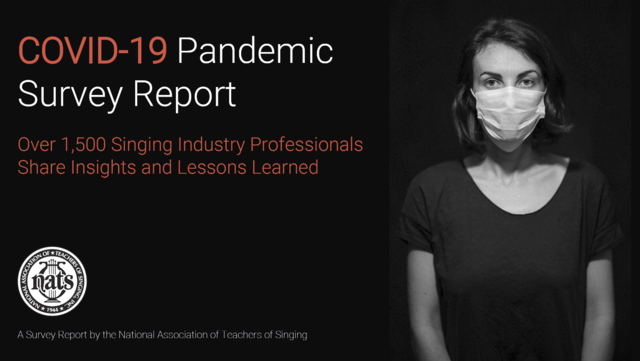Majority Of Singing Teachers Plan To Teach Online Post-Pandemic, According To New Survey
60% reported they would likely continue teaching remotely, resulting in a 43% increase in remote teaching, post-pandemic.
 Teaching online is here to stay, according to results from one of the largest surveys of singing teachers to date.
Teaching online is here to stay, according to results from one of the largest surveys of singing teachers to date.
The National Association of Teachers of Singing surveyed more than 1,500 industry professionals regarding their experience and the effect of the COVID-19 pandemic on the singing industry.
"As the premiere organization for singing teachers, NATS is naturally in an ideal position to lead state-of-the-industry surveys in our field," said Executive Director Allen Henderson. "Access to data helps us serve our community better, and we sincerely thank our membership and industry friends for participating in our landmark survey."
Many industries have suffered from the ongoing global health crisis, but those connected to singing - performers, venue owners and singing teachers - have experienced considerable struggles. When it became clear that aerosol particles and droplets were one of the main ways to spread the virus, singing was deemed an especially dangerous activity. As a result, the singing industry saw its own share of challenges and relied on a combination of tools to mitigate risks such as masks, enhanced ventilation, vaccines and the increase of online vs in-person teaching.
To help quantify and measure the pandemic effects, NATS worked with PracticeCraft to survey its membership and industry friends in the second quarter of 2021. Respondents answered questions related to the pandemic and the singing industry on overall experience, challenges, support networks, finances, changes in activities, and lessons learned.
While there are many takeaways, survey results confirmed a paradigm shift has occurred in regards to online teaching.
"The question we need to consider is not if the teaching of singing industry changed but how it changed as a result of the pandemic," said Anton Villado, principal consultant at PracticeCraft. "What the survey results confirm is that teachers of singing have gained or improved their remote technology skills. But what's most important, and has the potential to change the industry in meaningful ways, is that teachers of singing intend to continue using remote technologies in the future. Teaching, collaborating, learning, and work are likely to look different pre- versus post-pandemic."
Activities most likely to increase
Remote teaching, conferencing, learning, and working were the most changed activities when comparing pre-pandemic activities to post-pandemic predictions. Only 17% of respondents reported teaching remotely before the pandemic, but 60% reported they would likely continue teaching remotely, resulting in a 43% increase in remote teaching, post-pandemic.

"The survey responses validated what we have been observing and encouraging, which is that online teaching can be a valid vehicle for teaching singing," Henderson explained. "As it became apparent in the pandemic that many would need to embrace tech, teaching online helped catapult the industry into the modern era. This has allowed some teachers to expand their reach, collaborate in new ways, or experiment with alternative formats, like asynchronous lessons. It's a game changer. Students can receive quality singing instruction from a teacher in another state, country or even continent. The needs of the field also accelerated the development of low latency technologies to assist in the unique needs of teaching music at a distance."
Impact on personal income
Job change, loss or both affected one third (34%) of respondents, resulting in a more negative overall experience of the pandemic for these individuals.
Similarly, more than 70% of respondents reported an income change as well. The majority of these affected (59%) experienced a decrease in income, and they were nearly twice as likely to report a negative overall pandemic experience.

NATS pandemic response
On a positive note, NATS is proud to report that more than 75% of survey participants marked they were "satisfied" or "very satisfied" with the organization's pandemic response. The most frequently listed areas in which NATS did well include: singing-specific research (29%), remote events (22%), and remote teaching support (15%). NATS has been a leader in the response of the industry, partnering with sibling organizations to conduct research and share important and timely guidance to the profession throughout the pandemic to date.
The full report is available on the NATS website.

Read more about the National Association of Teachers of Singing at NATS.org.

Videos

